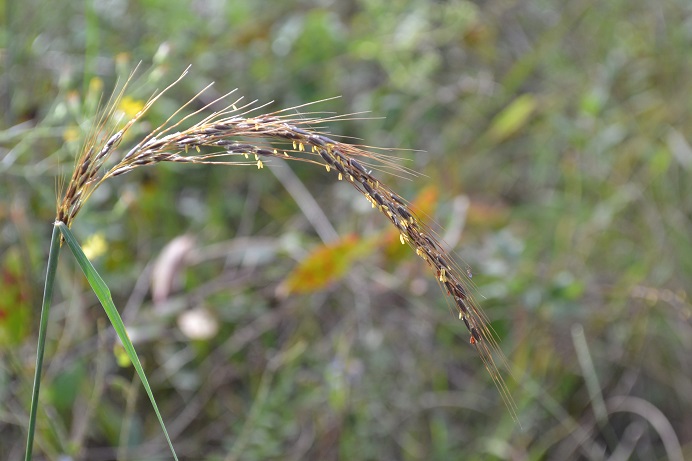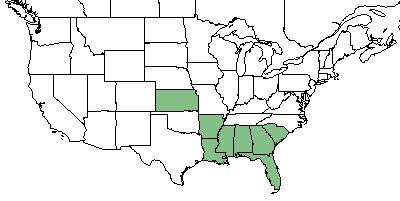Difference between revisions of "Sorghastrum secundum"
| Line 39: | Line 39: | ||
===Use by animals=== <!--Herbivory, granivory, insect hosting, etc.--> | ===Use by animals=== <!--Herbivory, granivory, insect hosting, etc.--> | ||
''S. secundum'' consists of 2-5% of the diet for terrestrial birds.<ref name="Miller & Miller 1999">Miller JH, Miller KV (1999) Forest plants of the southeast and their wildlife uses. Southern Weed Science Society.</ref> | ''S. secundum'' consists of 2-5% of the diet for terrestrial birds.<ref name="Miller & Miller 1999">Miller JH, Miller KV (1999) Forest plants of the southeast and their wildlife uses. Southern Weed Science Society.</ref> | ||
| − | + | ||
| + | ==Diseases and parasites== | ||
| + | Its seeds are more prone to mold destroying it prior to germination compared to other seeds.<ref name="Coffey & Kirkman 2006">Coffey KL, Kirkman LK (2006) Seed germination strategies of species with restoration potential in a fire maintained pine savanna. Natural Areas Journal 26(3):289-299.</ref> | ||
==Conservation and Management== | ==Conservation and Management== | ||
Revision as of 11:53, 16 January 2018
| Sorghastrum secundum | |
|---|---|

| |
| Photo by Kevin Robertson | |
| Scientific classification | |
| Kingdom: | Plantae |
| Division: | Magnoliophyta - Flowering plants |
| Class: | Liliopsida - Moncots |
| Order: | Poales |
| Family: | Poaceae |
| Genus: | Sorghastrum |
| Species: | S. secundum |
| Binomial name | |
| Sorghastrum secundum (Elliott) Nash | |

| |
| Natural range of Sorghastrum secundum from USDA NRCS Plants Database. | |
Common Name(s): lopsided indiangrass[1][2]
Contents
Taxonomic Notes
Synonym(s): Andropogon secundus[2]
Description
Sorghastrum secundum is a monoecious perennial graminoid[2] that grows to 3-6 feet (0.91-1.83 m).[3]
Distribution
S. secundum occurs from southern South Carolina, south to southern Florida, and westward to southern Alabama.[1]
Ecology
Habitat
This species is found on sandhills.[1]
Use by animals
S. secundum consists of 2-5% of the diet for terrestrial birds.[4]
Diseases and parasites
Its seeds are more prone to mold destroying it prior to germination compared to other seeds.[5]
Conservation and Management
Cultivation and restoration
Photo Gallery
References and notes
- ↑ 1.0 1.1 1.2 Weakley AS (2015) Flora of the Southern and Mid-Atlantic States. Chapel Hill, NC: University of North Carolina Herbarium.
- ↑ 2.0 2.1 2.2 USDA NRCS (2016) The PLANTS Database (http://plants.usda.gov, 16 January 2018). National Plant Data Team, Greensboro, NC 27401-4901 USA.
- ↑ Plant database: Sorghastrum secundum. (16 January 2018) Lady Bird Johnson Wildflower Center. URL: https://www.wildflower.org/plants/result.php?id_plant=SOSE5
- ↑ Miller JH, Miller KV (1999) Forest plants of the southeast and their wildlife uses. Southern Weed Science Society.
- ↑ Coffey KL, Kirkman LK (2006) Seed germination strategies of species with restoration potential in a fire maintained pine savanna. Natural Areas Journal 26(3):289-299.